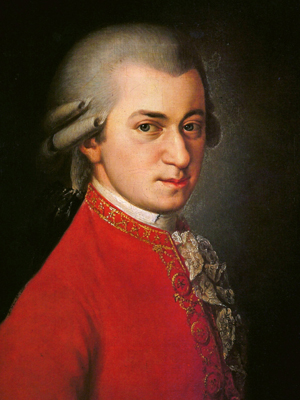
Masonic Biographies
Amadeus Mozart
Born: Tuesday, 27 January 1756
Died: Monday, 05 December 1791
Wolfgang Amadeus Mozart was a musician, composer, and Freemason who created undying, ethereal music for the world.
When considering innate talent, there may be none in history to rival Brother Wolfgang Amadeus Mozart's musical gift. As a child prodigy, Mozart started playing piano at age three and composed his first concerto at five. By nine, Mozart's talent was so well known that his first symphony was performed in London, and at the age of fourteen, he had written three complete operas. Brother Mozart's portfolio of musical works includes symphonies, sonatas, concertos, chamber music, masonic lodge music, piano compositions, and operas.
At the age of twenty-eight, Wolfgang was initiated into Freemasonry on December 14, 1784 as a member of Zur Wohltätigkeit (Beneficence) Lodge. Here Brother Mozart served his apprenticeship, was passed to the degree of Fellowcraft on January 7th, and was raised to the sublime degree of Master Mason on April 22nd of 1785.
Following in his son's footsteps, Mozart's father received the Second Degree on April 16, 1785. Bro. Wolfgang participated in the ceremony and composed the music, "Fellowcrafts Journey" (Op. K 468) to celebrate the auspicious occasion. He wrote two pieces of Masonic music for Beneficence Lodge: Opening Ode (Op. K 483) and Closing Ode (Op. K 484). Mozart's final Masonic composition (Op. K 623) was written for the opening of a new Masonic Temple in Vienna, which took place on November 15, 1791 shortly before his death.
In his final years, most of his compositions were devoted to Freemasonry. Perhaps Mozart's greatest work, the opera, The Magic Flute, highlights several integral Masonic themes: the importance of morality, the destruction of ignorance through enlightenment, and the virtues of knowledge, justice, wisdom, and truth. Moreover, the Opera demonstrates an enlightened portrayal of the Masonic virtue of Equality. The Heroine of The Magic Flute, Pamina, is initiated into an ancient, masonic-like order, on equal footing with the opera's Hero, Tamino. Musical scholar Julian Rushton wrote that “the implication that women should become initiates is the opera’s title to true Enlightenment.” Thus, with dedication and zeal, Brother Mozart bequeathed a rare and magnificent gift to humanity through his works of musical genius, demonstrating his belief that the highest possible human happiness is attained in a society governed by brotherly love, relief, and truth.
